And let’s be real—healing isn’t easy. It’s uncomfortable, it tests you, and it forces you to sit with feelings you’d rather ignore. But over time, you start to accept things for what they are. It’s a process, not a straight path. In my opinion, no one ever reaches a place of being completely healed. And that’s okay. What really matters is the progress, the resilience, and the choice to keep going, even when the way forward isn’t clear.

Photo credit: Canva free stock photos
Disclosure: This post contains affiliate links. As an Amazon Associate, I earn from qualifying. See my full disclosure policy for additional information.
Healing is a deeply personal journey, and understanding its key factors can help make the process more meaningful and intentional. Here are some important aspects to consider:
Acknowledging the Need for Healing
Healing begins with honesty. Ignoring pain doesn’t make it disappear—it buries it, only for it to resurface later, often in unexpected ways. Acknowledging what weighs on you is the first step toward healing. It means recognizing the wounds that still linger, the emotions you’ve suppressed, and the parts of you that need care. This isn’t about dwelling on the past but about allowing yourself to see and feel what’s there so you can begin the process of moving forward.
Healing begins with honesty.
Recognizing Your Triggers
Triggers aren’t roadblocks; they’re reflections. They show you where healing is still needed, revealing emotional wounds that haven’t fully closed. Instead of seeing triggers as setbacks, view them as signals, guides. When something stirs a deep emotional reaction, ask yourself why.
What is it bringing to the surface? What story is it reminding you of?
Triggers hold wisdom—if you listen, they can help you understand what still needs your attention. You can use journaling to channel your emotions and write down your triggers. Some people turn to therapy or coaching for guidance and support.
Managing Your Triggers
Recognizing triggers is one thing; learning how to navigate them is another. When emotions rise unexpectedly, how do you respond? Healing doesn’t mean you’ll never feel triggered again—it means you develop tools to regain balance when it happens. Whether it’s mindfulness, therapy, journaling, movement, or simply stepping away when you need to, finding what works for you is key.
The goal isn’t to avoid every trigger—it’s to build resilience so they no longer control you.
Accepting the Truth
Denial may feel like a protective shield, but it keeps you stuck in the same cycles. The truth—no matter how painful—frees you. Accepting reality doesn’t mean you have to be okay with it, but it does mean you stop running from it. It’s about seeing things as they are, not as you wish they were.

Photo credit: Canva free stock photos
Healing begins when you face the truth head-on, even when it’s uncomfortable.
Only then can you break free from patterns that no longer serve you.
Creating Space for Healing
Healing isn’t something that happens in the background of a chaotic life—it needs space to exist. Healing needs room to breathe. That means setting boundaries to protect your energy, allowing yourself to rest without guilt, and creating room for emotions instead of suppressing them. Sometimes, healing looks like quiet moments of reflection; other times, it’s saying no to things that drain you.
Growth doesn’t always happen in motion—sometimes, it happens in stillness.
Find out how embracing stillness sparks clarity through one blog post that explores the power of patience, introspection, and letting go. Sometimes, the answers we seek reveal themselves in silence.
Below is a poem that captures the essence of staying still and allowing clarity to find you.
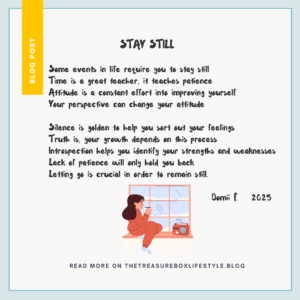
Evolving Through the Process
Healing isn’t just about getting past the pain—it’s about transformation. Every step you take, no matter how small, shapes you. Healing changes you. It reshapes your perspective. You may find yourself thinking differently, setting new boundaries, or approaching life with a deeper sense of self-compassion.
Healing teaches you patience, resilience, and the power of self-acceptance.
It’s not always linear, and that’s okay. Growth isn’t measured by how quickly you heal, but by how much you learn and evolve along the way.
Healing Doesn’t Always Mean Forgiveness
There’s a common belief that healing requires forgiveness—but does it really? The truth is, not every wound calls for forgiveness. Some betrayals run too deep, some harms are too great. Healing is about reclaiming your peace, not about making amends with the past or excusing the people who hurt you.
You don’t have to forgive someone to move forward.
You don’t need closure from the person who caused you pain. Real healing often comes from accepting what happened, setting firm boundaries, and deciding that your well-being matters more than holding onto someone else’s wrongs. Sometimes, the best thing you can do is simply walk away—without anger, without regret, and without looking back.
Final Thoughts
Understanding that Healing is a Journey is key. You might be waiting for a big moment when everything clicks and you feel “healed,” but the truth is, healing doesn’t work that way. It’s not a destination with a clear finish line—it’s an ongoing journey. Some days will feel light, and others heavy. But every time you choose to show up for yourself, you’re healing. Wherever you are in your journey, know this: you are not alone.
There is no “right” way to heal.
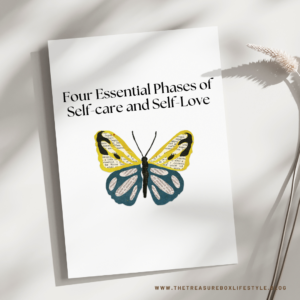
This self-help guide will help you in your journey of self-discovery. Get your copy now!
What matters is that you keep moving forward, in whatever way feels right for you. Take it one breath, one moment, one step at a time. You are healing, even when it doesn’t feel like it.
Whenever I hear someone say they’re healed, it makes me pause. I think about my own journey—those moments when my triggers still catch me off guard. Healing isn’t about never feeling the pain again; it’s about learning how to carry it differently, in a way that no longer controls you. 

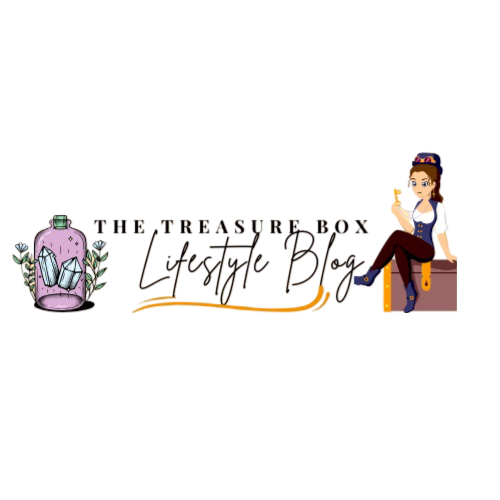
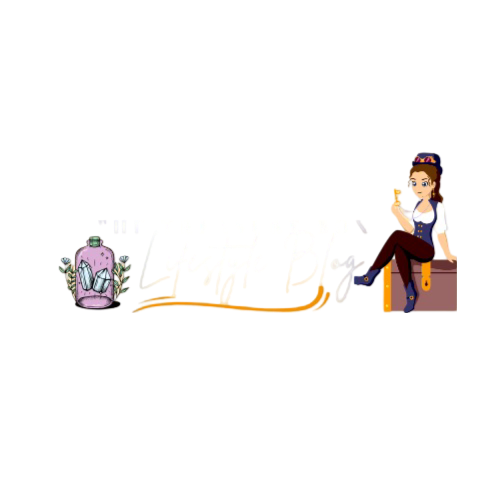





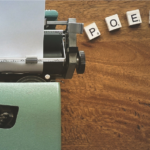




I love the idea of learning how to carry your pain differently. That’s so true and important! I also love your message about closure and how it’s not always like we think it should be, but we can work around that and keep living with compassion and love. Thank you!
Hi Kat,
I’m so glad this resonated with you! Pain doesn’t always disappear, but learning to carry it differently can be a powerful shift. And yes, closure isn’t always neat, but we can still move forward with love and grace. Thank you for sharing your thoughts!
I as well am coming to realize that growth and healing are on a continuum. I really appreciate this article and everything you highlighted, I needed to read it.
Hi Aca,
I’m really glad this spoke to you! Growth and healing take time, and we’re all learning as we go. Wishing you continued strength on your journey!
Oh how I loved reading this! You’re right about acknowledging your triggers and working towards them, that is the first step in healing.
Hi Anastasia,
Thank you so much! Loving that you feel so connected to this post. Healing is so personal and transformative!
The healing journey is a never ending one but so worth it. And you’re right, you can’t heal without facing the truth. Great post!
Hi Kathy,
Absolutely! Healing is a continuous process, and facing the truth is a powerful step forward. Thank you for your kind words!
Sometimes, experiencing the lows helps us truly appreciate the highs! Thanks for sharing, and I hope everyone finds themselves in a better mindset soon!
Hi Jarrod,
So true! The tough moments make the good ones even sweeter. Thank you!
A really lovely post. I like the way you look af triggers as signals of something that still needs healing, it makes it feel more positive. Loved reading this blog – Ash
Hi Ash,
Thank you so much! Seeing triggers as guidance rather than setbacks can make the healing journey feel more empowering. I’m so glad you are enjoying the blog!
This really speaks to me. Healing is definitely not a straight path, and it’s reassuring to be reminded that progress—no matter how small—is what truly matters. I appreciate the honesty about how tough it can be, but also the encouragement to keep moving forward. Such a powerful message!
Hi Ann,
I totally get what you mean. Healing really isn’t a straight path, and it’s so important to remember that every small step forward matters. I’m glad the post spoke to you—thank you for sharing your thoughts!
Healing is essential to get out of any tromatic experience and although it never completely goes away from us, it is needed for all of us in some point in time. Lovely read indeed!
Hi Hari,
Absolutely, healing is such a crucial part of moving forward from any traumatic experience. It may not fully disappear, but it helps us find peace and strength. Thank you for your thoughtful comment! Glad you enjoyed the read!
Oh, this speaks right to the soul. Healing isn’t about reaching some mythical finish line—it’s about the quiet, unseen moments of choosing to keep going. It’s in the breaking and the rebuilding, in the sitting with discomfort instead of running from it.
And that part about triggers? Yes. They aren’t roadblocks; they’re reflections. Little signposts showing us where tenderness still lingers, where love and care are still needed. The journey isn’t linear, and it’s never easy, but oh, how it shapes us. How it transforms.
This was a beautiful reminder that healing isn’t about perfection or even closure—it’s about honoring the process, making peace with the past, and stepping forward anyway. Thank you for this.
Hi Emily,
Ah, this hits so right! You’re so spot on about triggers—they really are more like little signposts, showing us where we still need some care and tenderness. It’s wild how healing isn’t about a finish line but those quiet, real moments of just… keeping on. So glad this connected with you, and thank you for sharing that reflection! It means a lot.
What a very honest post! I think emotional wounds are like some physical wounds: They heal, but there is a scar that never completely goes away. Oh, and paying attention to my triggers is something I’m just learning to do. Thank you for an insightful post!
Hi Danielle,
You’re so right—emotional wounds do leave scars, but they’re a part of our story and growth. I’m glad you like this post, and yes, paying attention to triggers can be a game-changer on the healing journey. Thanks so much for sharing your thoughts!
I agree I have been healing from my last depression wave
Hi Jimmy,
I’m really glad you’re finding your way through it. Healing from something like depression is a journey, and it’s great that you’re taking steps forward.
I completely agree that managing and acknowledging your triggers and a very important part of the healing process.
Hi Alana,
Absolutely. Being aware of triggers is such a big step in healing—it’s like giving yourself a roadmap to understand what still needs care and attention.
This is so beautifully written and accurate. I appreciate your honesty, candor and vulnerability.
Hi Pantea,
That truly means a lot—thank you! Healing is such a journey, and sharing it honestly just makes it more real. I appreciate you taking the time to read and connect with it!
Healing is a lifelong journey. Great post. ❤️
Hi Sheenia,
Thank you so much! It really is—growth and healing go hand in hand. Appreciate you taking the time to read!
Healing takes time and patience. It also takes a lot of thought. Great post!
Hi David,
Absolutely! Healing isn’t just about time—it’s about patience and all the reflection that comes with it. Glad you connected with the post!
In finally starting my own journey toward healing, I have to say this post certainly resonated with me. I now know that this a long process that will probably continue for the rest of my existence here (there’s a lot to unpack), but I’m happier already, even if it’s just at the notion that I’m taking steps to help my future be brighter than my past. Thanks!
Hi Melonie,
I love hearing that you’re taking steps toward healing—it’s such a brave and beautiful thing. It really is a lifelong journey, but every step forward matters, and the fact that you’re already feeling a shift is incredible. Wishing you continued strength, peace, and so much joy along the way. You deserve it all!